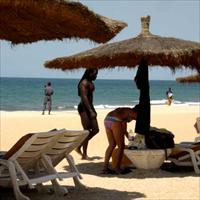MOZAMBIQUE: Tourism, beaches and sex - a recipe for HIV

With its white sand and sunny blue skies, Miramar Beach in the port city of Beira, Mozambique, has all the right ingredients to draw tourists from all over the world.
But that is not all this idyllic coastline attracts. "The beach is fertile ground for the spread of the [HI] virus, because so many people's paths cross there," said Victoria Machava, who works for the Beira municipal health department.
Miramar Beach is in Sofala Bay, close to the main Indian Ocean shipping routes and the largest airport in Mozambique's central region; it is not only ideally situated for tourism but also for the sex trade.
The explosion in both has led Beira's municipal government and local non-governmental organisations to launch HIV/AIDS awareness-raising campaigns in areas like Miramar to reach tourists, most of whom are European, as well as locals, including sex workers and fishermen.
Billboards along the beach warn people about the dangers of HIV, while a group of 15 activists from the city council provides prevention information and distributes condoms. "The environment entices people to have sex, but we've noticed that many of those who come to the beach don't bring condoms with them," said Zito Lazaro, 23, one of the activists.
High prevalence, high risk
An HIV infection rate of 35 percent - more than double the national average - means Beira is the worst-affected city in Sofala, Mozambique's worst-affected province. According to official figures, half of all new HIV infections identified in Sofala Province in 2007 were reported in Beira - a total of 11,242 cases.
The city's high prevalence can partly be attributed to its location at one end of the corridor linking Mozambique to Zimbabwe, Malawi and Botswana: countries with HIV infection rates that are among the highest in the world.
Truck drivers, sex workers, fishermen and street children, some of the groups most vulnerable to HIV infection, mingle with tourists, other visitors and locals on Miramar Beach.
Virgínia M.*, a 31-year-old sex worker, thinks she became infected with HIV during an unprotected sexual encounter at an eating establishment near the beach. Despite being aware of the risks, she said money sometimes talks louder: sex with a condom costs about US$4, but she can charge $10 for unprotected sex.
With support from the province's AIDS unit, 14 community-based AIDS organisations in the region have joined forces with the Beira municipal government to carry out campaigns in areas with the highest risk. At the weekends, they give lectures and screen educational films on the beach, in shops and in night clubs.
"Behind the high infection rate are high risk factors," said Machava of the city's health department. "That's why we're fighting not to allow a breeding ground for the spread of the virus."
*not her real name
 Back and Next - Back and Next
Back and Next - Back and Next See Also - See Also
See Also - See Also